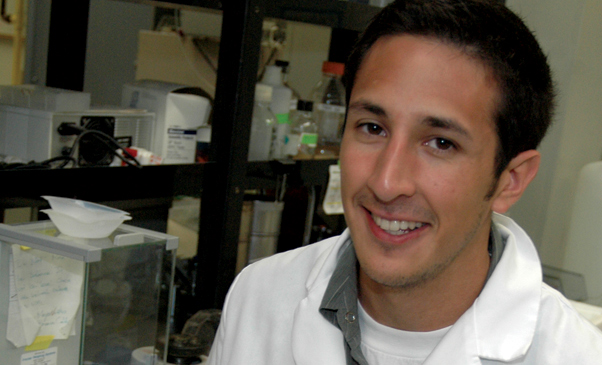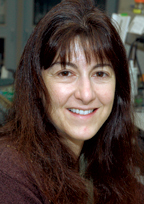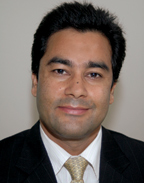Learning in the Lab
Undergraduates in NSM and ECS have abundant opportunities to participate in research studies
January 3, 2008
By Russ Hudson
Here’s a little known fact: research opportunities are plentiful for undergraduates in the colleges of Natural Sciences and Mathematics and Engineering and Computer Science.
For example, Carlos Garcia, a senior
civil and environmental engineering major, and Ishwar Dhungana, a graduate
student in the same major, are working with Binod Tiwari, assistant professor
of civil and environmental
engineering, on a research project titled “Reduction of the Stability
of Pre-existing Landslides During Earthquakes.”
“We are studying the Prithwi Highway in Nepal, which has a history of landslides,” Tiwari said. “We are using a geographical information system for capturing, storing, analyzing and managing data and associated attributes.”
The road, which is important to the
region, has been blocked many times because of landslides, so there is
a great deal of existing data to work with, Tiwari said, “and it
is always cheaper to work with existing data than it is to generate all
your data from the beginning.”
QUOTE: “We are using a geographical information system for capturing,
storing, analyzing and managing data and associated attributes.”
— Binod Tiwari
The information gathered, he said, will have applications worldwide.
Myriad other research projects that NSM and ECS students are working
on include studies dealing with Alzheimer’s disease, increasing
life expectancy, pharmaceuticals, bridge construction, robotics, atmospheric
chemistry, lasers, the role of metals in the human body, preserving rocky
coastlines, monitoring endangered species, tracking climate changes since
the last ice age, quickly detecting toxins in water, and removing contaminants
and harmful microbes from water.
Many NSM and ECS students also can take part in the Minority Access to Research Careers program.
MARC offers research opportunities for underrepresented students seeking careers in biomedical research and is funded by grants from the National Institute of General Medical Sciences, one of the National Institutes of Health.
This year’s MARC scholars are: junior chemistry majors Anna Trinidad and Gary Gallego, junior psychology majors Lilia Rodriguez and Vanessa Harris, senior biological sciences major Jose Corleto, and Jacob Gonzalez, a senior biochemistry major.
“We take scholars into the program when they are finishing their last two years of classes at the university,” said Amybeth Cohen, associate professor of biological science and Cal State Fullerton’s MARC director. “We also have our first pre-MARC scholar, Rolando Ruiz, a sophomore biological science student. We hope to expand the pre-MARC program. It allows the students to prepare for MARC, which is research-intensive and includes a number of assignments.”
QUOTE: “We hope to expand the pre-MARC program. It allows the
students to prepare for MARC, which is research-intensive and includes
a number of assignments.”
— Amybeth Cohen
Cohen said Ruiz sits in on the MARC seminars, completes all assignments, has a research mentor and conducts research. However, he is not receiving the stipend or travel money that full MARC scholars receive.
The MARC program provides high-quality research training to undergraduates through a curriculum that includes an enhanced seminar series and experience conducting research with Cal State Fullerton faculty members. MARC Scholars also receive personalized career and academic advisement and experience in presenting research data on campus and at national conferences.
Program applicants must be from an ethnic backgroun underrepresented in biology, chemistry, biochemistry, psychology, bioengineering and other biomedical-related fields. Also considered are applicants who represent the first generation in his or her family — regardless of ethnicity — to attend a four-year university, or who come from a high school that does not send a high percentage of its students to a four-year college. Students from any ethnicity who can provide proof of financially disadvantaged status also can apply.
And, Cohen emphasized, “applicants must intend to pursue a Ph.D. or M.D./Ph.D. program in biology, biochemistry, chemistry, psychology, bioengineering or other biomedical-related field.”
Other
programs offering research experiences are the Minority Health and Health
Disparities International Research Training Program (usually shortened
to MHIRT), funded by the National Institutes of Health’s National
Center on Minority Health and Health Disparities, which sends students
to foreign universities to work with researchers there over the summer;
and the National Science Foundation-funded Research Experiences for Undergraduates,
which brings students to the campus to
work with faculty.
In addition, there are opportunities for undergraduate and graduate students to work with faculty on research that is funded directly from outside sources, that is, not through university channels.



